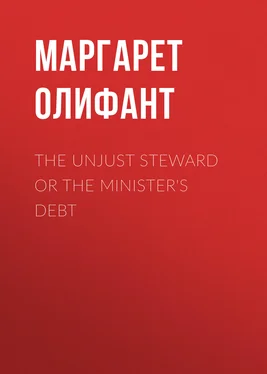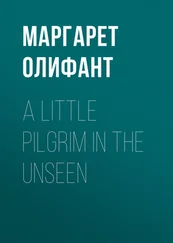Маргарет Олифант - The Unjust Steward or The Minister's Debt
Здесь есть возможность читать онлайн «Маргарет Олифант - The Unjust Steward or The Minister's Debt» — ознакомительный отрывок электронной книги совершенно бесплатно, а после прочтения отрывка купить полную версию. В некоторых случаях можно слушать аудио, скачать через торрент в формате fb2 и присутствует краткое содержание. Издательство: Иностранный паблик, Жанр: foreign_prose, literature_19, foreign_antique, на английском языке. Описание произведения, (предисловие) а так же отзывы посетителей доступны на портале библиотеки ЛибКат.
- Название:The Unjust Steward or The Minister's Debt
- Автор:
- Издательство:Иностранный паблик
- Жанр:
- Год:неизвестен
- ISBN:нет данных
- Рейтинг книги:3 / 5. Голосов: 1
-
Избранное:Добавить в избранное
- Отзывы:
-
Ваша оценка:
- 60
- 1
- 2
- 3
- 4
- 5
The Unjust Steward or The Minister's Debt: краткое содержание, описание и аннотация
Предлагаем к чтению аннотацию, описание, краткое содержание или предисловие (зависит от того, что написал сам автор книги «The Unjust Steward or The Minister's Debt»). Если вы не нашли необходимую информацию о книге — напишите в комментариях, мы постараемся отыскать её.
The Unjust Steward or The Minister's Debt — читать онлайн ознакомительный отрывок
Ниже представлен текст книги, разбитый по страницам. Система сохранения места последней прочитанной страницы, позволяет с удобством читать онлайн бесплатно книгу «The Unjust Steward or The Minister's Debt», без необходимости каждый раз заново искать на чём Вы остановились. Поставьте закладку, и сможете в любой момент перейти на страницу, на которой закончили чтение.
Интервал:
Закладка:
Mr. Buchanan fought a battle with himself, of which no one had the faintest idea, when his wife left him that afternoon. She indeed never had the faintest idea of it, nor would any one have known had it not been for the chance that shut up those two children in the turret-room. They did not understand what they had heard, but neither did they forget it. Sometimes, the one would say to the other:
“Do you remember that afternoon when we were shut up in the turret and nobody knew?” When such a thing had happened before, they had laughed; but at this they never laughed, though they could not, till many years had passed, have told why. The boy might have forgotten, for he had a great many things to think of as the toils of education gathered round him and bound him faster and faster; but the girl, perhaps because she had not so much to do, there being no such strain of education in those days for female creatures, never forgot. She accompanied her father unconsciously in his future, during many a weary day, and pitied him when there was no one else to pity.
In the meantime, as the children saw, Mr. Buchanan went out; he went to old Mr. Anderson’s house to inquire for him before he did any of his usual afternoon duties. And after he had completed all these duties, he went back again, with a restlessness of anxiety which touched all the people assembled round the dying man, his brother who had been summoned from Glasgow, and his doctors, one of whom had come from Edinburgh, while the other was the chief practitioner of St. Rule’s, and his nurses, of whom there were two, for he had no one of his own, no woman to take care of him. They thought the minister must be anxious about the old gentleman’s soul that he should come back a second time in the course of the afternoon, and Dr. Seaton himself went down-stairs to reply to his inquiries.
“I am afraid I cannot ask you to come up-stairs, for he is past all that,” he said, in the half scornful tone which doctors sometimes assume to a clerical visitor.
“Is he so bad as that?” said the minister.
“I do not say,” said Dr. Seaton, “that our patient may not regain consciousness. But certainly, for the present, he is quite unable to join in any religious exercises.”
“I was not thinking of that,” said Mr. Buchanan, almost humbly, “but only to take the last news home. Mr. Anderson has been a good friend to me.”
“So he has been to many,” said Dr. Seaton. “Let us hope that will do more for him where he is going than prayer.”
“Prayer can never be out of place, Dr. Seaton,” said the minister. He went away from the door angry, but still more cast down, with his head sunk on his breast as the children had seen him. He had no good news to take home. He had no comfort to carry with him up to his study, whither he went without pausing, as he generally did, to say a word to his wife. He had no word for anybody that evening. All night long he was repeating to himself the words of the parable, “Sit down quickly, and take thy bill, and write fifty.” Could God lead men astray?
CHAPTER III.
AFTER THE FUNERAL
“After the funeral, after the funeral will be time enough,” Mr. Buchanan said, when his wife urged him to get it over, and to have his interview with Mr. Morrison, the man of business, in whose hands all Mr. Anderson’s affairs were. Everybody remarked how ill the minister was looking during the week which elapsed between the old man’s death and the large and solemn funeral, which filled the entire length of the High Street with black-coated men. It was a funeral d’estime . There was no active sorrow among the long train of serious people who conducted his mortal part to its long home, but there were a great many regrets. His was a figure as well known as the great old tower of St. Rule, which is one of the landmarks from the sea, and the chief distinction of the town on land, and he was a man who had been kind to everybody. He had been very well off, and he had lived very quietly, spending but little money on himself, and he had no near relation, only a distant cousin’s son, to inherit what he had to leave behind him, for the brother, who was the chief mourner, was a lonely man like himself, and also rich, and without heirs. This being the case, old Mr. Anderson had used his money as few rich men do. He had behaved to many people as he had done to Mr. Buchanan. He had come to the aid of many of the poor people in St. Rule, the fisher population, and the poor shopkeepers, and many a needy family; therefore, though there were perhaps few tears shed, there was a great and universal regret in all the town. Many men put on their “blacks,” and went East, which was their way of indicating the quaint burying-ground that encircled the ruins of the old cathedral, who would not have swelled any other funeral train in the neighbourhood. He was a loss to everybody; but there were few tears. An old man going home, nearer eighty than seventy as the people said, a good old man leaving the world in charity with everybody, and leaving nobody behind whom he would miss much when he got there. A woman, here and there, at her doorhead or her stairfoot, flung her apron over her head as she watched the procession defiling into the wide space before the churchyard, which was visible from the houses at the fishers’ end of the lower street. But the tears she shed were for grief’s sake, and not for grief—for there was no weeping, no desolation, only a kind and universal regret.
Mr. Buchanan was more blanched and pale than ever, as he walked bareheaded behind the coffin. There was one, everybody said, who had a feeling heart—and many were glad when the ceremonial—always of so very simple a kind in the Scotch church, and in those days scarcely anything at all, a short prayer and no more—was over, with the thought that the minister being evidently so much out of health and spirits, and feeling the loss of the kind old elder so deeply, was just in the condition in which some “get their death,” from the exposure and chill of a funeral. Several of his friends convoyed him home after all was completed, and warned Mrs. Buchanan to take very good care of him, to give him some good, strong, hot toddy, or other restorative, and do all she could to bring back his colour and his spirit.
“We have all had a great loss,” said Mr. Moncrieff, who was another leading elder, shaking his head, “but we are not all so sensitive as the minister.”
Poor Mrs. Buchanan knew much better than they did what made the minister look so wae. She took all their advices in very good part, and assured his friends that the minister felt their kindness, and would soon be himself again. Alas, there was that interview still to come, which she thought secretly within herself she would have got over had she been the minister, and not have thus prolonged the agony day after day. There were a great many things that Mrs. Buchanan would have done, “had she been the minister,” which did not appear in the same light to him—as indeed very commonly happens on either side between married people. But she accepted the fact that she was not the minister, and that he must act for himself, and meet his difficulties in his own way since he would not meet them in hers. She did not comfort him with hot and strong toddy, as the elders recommended; but she did all she knew to make him comfortable, and to relieve his burdened spirit, pointing out to him that Mr. Morrison, the man of business, was also a considerate man, and acquainted with the difficulties of setting out a family in the world, and impressing upon him the fact that it was a good thing, on the whole, that Willie’s outfit had been paid at once, since Mr. Morrison, who would be neither better nor worse of it in his own person, would be, no doubt, on behalf of the heir, who was not of age nor capable of grasping at the money, a more patient creditor than a shop in Edinburgh, where a good discount had been given for the immediate payment of the account.
Читать дальшеИнтервал:
Закладка:
Похожие книги на «The Unjust Steward or The Minister's Debt»
Представляем Вашему вниманию похожие книги на «The Unjust Steward or The Minister's Debt» списком для выбора. Мы отобрали схожую по названию и смыслу литературу в надежде предоставить читателям больше вариантов отыскать новые, интересные, ещё непрочитанные произведения.
Обсуждение, отзывы о книге «The Unjust Steward or The Minister's Debt» и просто собственные мнения читателей. Оставьте ваши комментарии, напишите, что Вы думаете о произведении, его смысле или главных героях. Укажите что конкретно понравилось, а что нет, и почему Вы так считаете.












